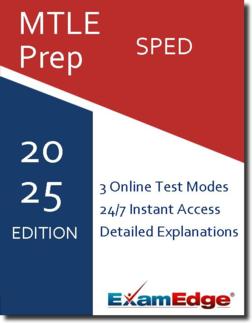MTLE Special Education (186/187) Practice Tests & Test Prep by Exam Edge - FAQ
Based on 17 Reviews
- Real Exam Simulation: Timed questions and matching content build comfort for your MTLE SPED test day.
- Instant, 24/7 Access: Web-based MTLE Special Education Core Skills practice exams with no software needed.
- Clear Explanations: Step-by-step answers and explanations for your MTLE exam to strengthen understanding.
- Boosted Confidence: Reduces anxiety and improves test-taking skills to ace your MTLE Special Education Core Skills (186/187).

Why should I use Exam Edge to prepare for the MTLE Special Education Core Skills Exam?
FAQ's for Exam Edge MTLE Special Education Core Skills practice tests
- Comprehensive content: Exam Edge's MTLE Special Education Core Skills practice tests are created specifically to prepare you for the real exam. All our MTLE SPED practice test questions parallel the topics covered on the real test. The topics themselves are covered in the same proportions as the real test too, based on outlines provided by the Minnesota Teacher Licensure Examinations in their MTLE SPED test guidelines.
- Realistic practice: Our MTLE SPED practice exams are designed to help familiarize you with the real test. With the same time limits as the real exam, Our MTLE practice tests enable you to practice your pacing and time management ahead of test day.
- Detailed explanations: As you complete your practice tests, we show you which questions you answered correctly and which ones you answered incorrectly, in addition to providing you with detailed step-by-step explanations for every single MTLE Special Education Core Skills practice exam question.
- Performance insights: After you complete a practice test, we provide you with your raw score (how many you answered correctly) and our estimate of the MTLE SPED score you would have received if you had taken the real test.
- Ease of access: Because all Our MTLE practice tests are web-based, there is no software to install. You can take MTLE SPED practice exams on any device with access to the internet, at any time.
- Flexible use: If you must pause while taking one of Our MTLE practice exam, you can continue right where you left off. When you continue the test, you will start exactly where you were, and with the same amount of time you had remaining.
- Thousands of unique questions: We offer 15 different online practice exams with 1,500 unique questions to help you prepare for your MTLE Special Education Core Skills !
- Low cost: The cost of ordering 5 practice tests is less than the cost of taking the real MTLE SPED test. In other words, it would be less expensive to order 5 practice tests than to retake the real MTLE Special Education Core Skills exam!
- Our trusted reputation: As a fully accredited member of the Better Business Bureau, we uphold the highest level of business standards. You can rest assured that we maintain all of the BBB Standards for Trust.
- Additional support: If you need additional help, we offer specialized tutoring. Our tutors are trained to help prepare you for success on the MTLE Special Education Core Skills exam.
What score do I need to pass the MTLE SPED Exam?
To pass the MTLE Special Education Core Skills test you need a score of 240.
The range of possible scores is 100 to 300.
How do I know the practice tests are reflective of the actual MTLE Special Education Core Skills ?
At Exam Edge, we are proud to invest time and effort to make sure that Our MTLE practice tests are as realistic as possible. Our practice tests help you prepare by replicating key qualities of the real test, including:
- The topics covered
- The level of difficulty
- The maximum time-limit
- The look and feel of navigating the exam
Do you offer practice tests for other Minnesota Teacher Licensure Examinations subjects?
Yes! We offer practice tests for 29 different exam subjects, and there are 465 unique exams utilizing 43945 practice exam questions. Every subject has a free sample practice test you can try too!
MTLE Basic Skills Test
MTLE Basic Skills Mathematics (003)
Practice Tests
MTLE Basic Skills Reading (001)
Practice Tests
MTLE Basic Skills Writing (002)
Practice Tests
MTLE Content-Area Tests
MTLE Business (082, 083)
Practice Tests
MTLE Chemistry (058, 059)
Practice Tests
MTLE Early Childhood (Birth - Grade 3) (020, 021)
Practice Tests
MTLE Earth and Space Science (9-12) (060, 061)
Practice Tests
MTLE Elementary Education (K-6) (530)
Practice Tests
MTLE English as a Second Language (K-12) (114, 115)
Practice Tests
MTLE Family and Consumer Sciences (Grades 5-12) (84)
Practice Tests
MTLE Health (056, 057)
Practice Tests
MTLE Library Media Specialist (K-12) (102, 103)
Practice Tests
MTLE Life Science (9-12) (062, 063)
Practice Tests
MTLE Mathematics (5-12) (054, 055)
Practice Tests
MTLE Middle Level Mathematics (5-8) (034, 035)
Practice Tests
MTLE Middle Level Science (5-8) (036, 037)
Practice Tests
MTLE Middle Level Social Studies (5-8) (032, 033)
Practice Tests
MTLE Physical Education (k-12) (112, 113)
Practice Tests
MTLE Physics (9-12) (064, 065)
Practice Tests
MTLE Pre-Primary (Age 3-PreK) (022, 023)
Practice Tests
MTLE Reading Teacher (K-12) (100,101)
Practice Tests
MTLE Social Studies (5-12) (052, 053)
Practice Tests
MTLE Special Education Core Skills (186/187)
Practice Tests
MTLE Technology (Grades 5-12) (80)
Practice Tests
MTLE Visual Arts (K-12) (104, 105)
Practice Tests
MTLE World Language & Culture Spanish (K-12) (164, 165)
Practice Tests
MTLE Pedagogy Tests
MTLE Pedagogy Early Childhood (Birth to Grade 3) (010)
Practice Tests
MTLE Pedagogy Elementary (Grades K-6) (012)
Practice Tests
MTLE Pedagogy Secondary (Grades 5-12) (014)
Practice Tests
To order full-length tests, or take a sample test, for a different subject:
Click on ' Name on the Exam Name' You will be take to the orders page
How do I register for the real Minnesota Teacher Licensure Examinations?
For up-to-date information about registration for the Minnesota Teacher Licensure Examinations, refer to the Minnesota Teacher Licensure Examinations website.


